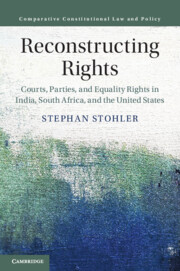Refine search
Actions for selected content:
8 results
1 - The Written Constitution and the Emergence of Judicial Supremacy
-
- Book:
- The Changing Constitution
- Published online:
- 21 August 2025
- Print publication:
- 21 August 2025, pp 18-34
-
- Chapter
- Export citation
4 - Objections, Alternatives, and Refinements
- from Part I - Symmetry Explained
-
- Book:
- Constitutional Symmetry
- Published online:
- 14 November 2024
- Print publication:
- 21 November 2024, pp 87-112
-
- Chapter
- Export citation
1 - Constitutionalism beyond Manicheanism
- from Part I - Institutions and Interactions
-
- Book:
- The Collaborative Constitution
- Published online:
- 12 October 2023
- Print publication:
- 26 October 2023, pp 31-57
-
- Chapter
- Export citation
6 - Legislated Rights
- from Part II - Rights in Politics
-
- Book:
- The Collaborative Constitution
- Published online:
- 12 October 2023
- Print publication:
- 26 October 2023, pp 170-202
-
- Chapter
- Export citation
The rule of law and the role of courts
-
- Journal:
- Global Constitutionalism / Volume 10 / Issue 1 / March 2021
- Published online by Cambridge University Press:
- 15 April 2021, pp. 91-105
-
- Article
- Export citation
Bench over Ballot: The Fight for Judicial Supremacy and the New Constitutional Politics, 1910–1916
-
- Journal:
- The Journal of the Gilded Age and Progressive Era / Volume 20 / Issue 1 / January 2021
- Published online by Cambridge University Press:
- 03 August 2020, pp. 2-23
- Print publication:
- January 2021
-
- Article
- Export citation
1 - The Politics of Legal Interpretation
- from Part I - Introduction
-
- Book:
- Reconstructing Rights
- Published online:
- 09 July 2019
- Print publication:
- 18 July 2019, pp 3-28
-
- Chapter
- Export citation

Reconstructing Rights
- Courts, Parties, and Equality Rights in India, South Africa, and the United States
-
- Published online:
- 09 July 2019
- Print publication:
- 18 July 2019
